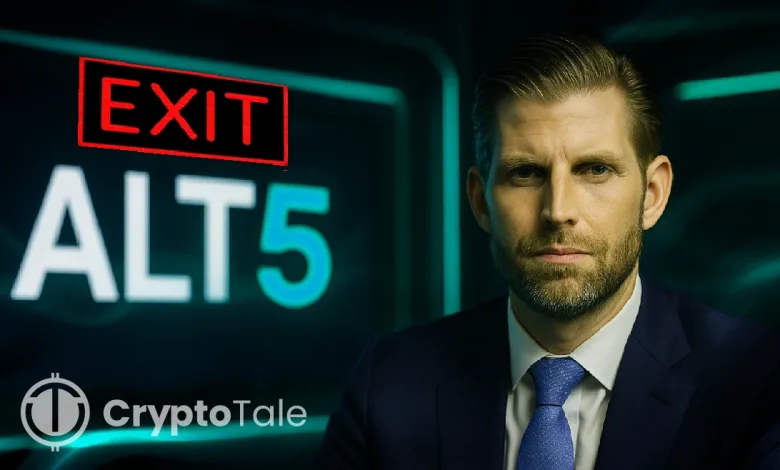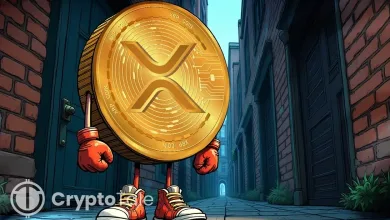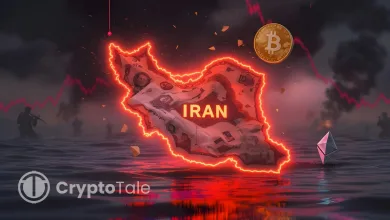Eric Trump Removed From Alt5 Sigma Board After Nasdaq Review

- The Nasdaq review forced Eric Trump out of the Alt5 Sigma board in the WLFI deal.
- Alt5 Sigma intends to raise $1.5 billion to buy WLFI tokens from the Trump venture.
- Experts assert that the rule behind Trump’s removal remains unclear and unexplained.
In a surprising turn, Eric Trump has been abruptly removed from Alt5 Sigma’s board after Nasdaq raised governance concerns, casting fresh doubt on the $1.5 billion Trump-linked crypto deal. According to a source, Eric was initially named as a director in August as part of a $1.5 billion transaction involving World Liberty Financial. Yet filings later disclosed that his role was altered and he will be set to serve only as a board observer pending stockholder approval.
The company’s securities filing stated the change came “after discussion with The Nasdaq Stock Market LLC (‘Nasdaq’), and to comply with Nasdaq’s listing rules.” Alt5 Sigma, which is incorporated in Nevada, did not specify the exact rule that blocked Eric’s directorship. Instead, World Liberty Financial’s Chief Operating Officer and co-founder, Zak Folkman, replaced him as a proposed board member.
Legal experts noted they could not identify which rule required the change. Nasdaq requires a majority of directors at listed companies to be independent. If Eric did not qualify as independent, it remained unclear why Folkman would. The shift also did not appear linked to Trump’s legal restrictions in New York, since Alt5 Sigma is incorporated elsewhere.
The $1.5 Billion Treasury Plan
Alt5 Sigma Corporation, trading under ticker ALTS, is a fintech company that offers tokenization, trading, payment, and asset custody solutions powered by blockchain technology. In August, the company unveiled a plan to raise $1.5 billion through a combination of direct and private share sales.
The capital would be used to acquire tokens from World Liberty Financial, a crypto startup launched in September 2024 by Donald Trump and his three sons. WLFI tokens were first sold at $0.015 in October 2024 to accredited and foreign investors, followed by a second round at $0.05. The tokens remain non-transferable, restricting their trading outside designated channels.
As part of the deal, Alt5 Sigma originally announced that Eric Trump would become a director while Zak Folkman would join as an observer. The Nasdaq consultation reversed that structure, pushing Eric to observer status, while Folkman bagged the director role.
Related: Eric Trump Sees Bitcoin at $1M and Calls China a Strong Force
Regulatory Questions and Market Scrutiny
The reversal drew attention from governance experts, who questioned about consistency and compliance. Moreover, three securities law professors stated that they could not identify a clear Nasdaq rule that applied exclusively to Eric Trump. Observers have warned that Alt5 Sigma’s deal with World Liberty Financial exposes the firm to increased scrutiny.
As both companies are closely linked to the Trump family, regulators and investors remain alert for possible conflicts of interest. Transactions where affiliates appear on both sides could raise concerns about valuation practices and market manipulation.
The plan’s supporters suggest that if the $1.5 billion treasury strategy works, WLFI might achieve institutional visibility and investor trust, following its public listing via Alt5 Sigma. It might therefore provide indirect regulated exposure for investors to the Trump-linked token.
Governance Rules and Tokens Strategy at a Crossroads
Nasdaq’s listing standards are designed to protect investors by providing board independence, transparency in governance, and robust compliance from listed companies. In the case of Alt5 Sigma, the removal of Eric Trump reflects how these requirements extend beyond technicalities and serve as safeguards against conflicts of interest that could reduce or further undermine the shareholders’ trust.
If WLFI can successfully navigate Nasdaq’s rules, it could establish a precedent for how politically connected crypto projects structure token adoption through public market vehicles. Still, any failure to adapt may leave its long-term token strategy vulnerable to both regulatory pushback and investor skepticism.




